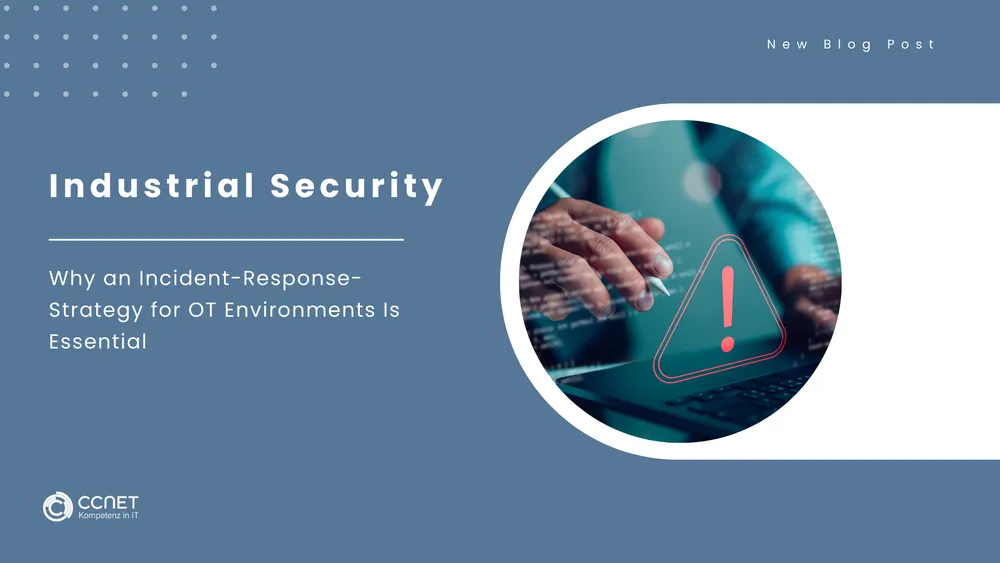
CCNet
May 5, 2025 • 3 min read

Next-Gen Firewalls & Network Segmentation: How Companies Secure IT & OT Environments
Critical production facilities are more connected today than ever before – and that makes them vulnerable.
Without clear network segmentation, cyberattacks can spread freely between IT and OT systems.
Many industrial companies already protect their IT with firewalls, but traditional firewalls are not enough to secure industrial control systems (SCADA, PLCs) and IoT devices from modern attacks.
The Solution?
Next-Gen Firewalls (NGFW) & a well-thought-out network segmentation strategy for maximum IT and OT security.
Further information can be found here: it-infrastructure-hardening
Why Is a Traditional Firewall No Longer Enough?
Production networks were long considered "closed systems." But with Industry 4.0, IoT integration, and cloud-based solutions, the boundaries between IT and OT have blurred.
Typical Security Gaps in Production Networks:
- No separation between IT & OT – An attack on the IT network can spread directly to machines.
- Remote access to control systems without protection – Maintenance teams or third parties can access machine controls directly.
- IoT sensors as an entry point for cyberattacks – Unencrypted communication makes sensors vulnerable.
- SCADA & PLC controllers using insecure protocols – Many OT protocols (e.g., Modbus, OPC UA) were never designed for cybersecurity.
- A traditional firewall cannot effectively secure industrial networks – modern security solutions are required.
Next-Gen Firewalls: The Key to Secure Network Segmentation
Next-Gen Firewalls (NGFW) go far beyond the capabilities of traditional firewalls. They can deeply analyze network traffic, understand industrial protocols, and detect attacks in real time.
Key Features of Next-Gen Firewalls for IT & OT:
- Deep Packet Inspection (DPI): Detects & blocks threats in OT protocols.
- Access control based on user identities (IAM integration).
- Detection & blocking of anomalies in machine communication.
- Automatic threat detection using AI & machine learning.
- Segmentation of production networks to contain attacks.
The Goal:
Isolate IT, OT, and IoT systems and allow only authorized data traffic.
Notable Cyberattacks That Could Have Been Prevented by Network Segmentation
-
Ransomware Attack on an Italian Manufacturing Company (2022)
Hackers entered through an unprotected remote access point in the IT network and spread freely into OT systems.
Consequence: Production downtime for several days, significant financial damage.
Prevention with NGFW: Strict segmentation between IT & OT would have prevented the spread. -
Attack on Critical Infrastructure via VPN Exploits (2021)
Hackers exploited unpatched VPN access points to gain unauthorized access to industrial control systems.
Consequence: Manipulation of process controls, production delays.
Prevention with NGFW: Network segmentation & traffic monitoring would have blocked the attack.
Conclusion: Without Next-Gen Firewalls & Network Segmentation, production networks are easy targets for hackers.
How Companies Can Improve IT & OT Security with Network Segmentation
-
Strict Separation of IT & OT Networks with Next-Gen Firewalls
IT and production systems must be segmented into separate networks.
Firewall rules should restrict data flow between IT & OT to the absolute minimum. -
Implement a Zero-Trust Approach for Access Control
Use IAM (Identity & Access Management) with strict access rights for production controls.
Enable Multi-Factor Authentication (MFA) for all remote access to OT systems. -
Deploy Security Solutions for Industrial Protocols
Next-Gen Firewalls must analyze & protect OT protocols such as Modbus, DNP3, OPC UA.
Use automated threat detection through machine learning. -
Activate Intrusion Detection (IDS) & SIEM for OT Environments
SIEM (Security Information & Event Management) for real-time analysis of OT network activity.
IDS (Intrusion Detection Systems) for anomaly detection in production systems. -
Conduct Regular Audits & Penetration Testing for Industrial Networks
Regularly test vulnerabilities in OT networks.
Continuously optimize firewalls & security systems.
Conclusion: Without Next-Gen Firewalls, Production Networks Are Vulnerable
Attacks on industrial networks are increasing – traditional firewalls are no longer sufficient.
Next-Gen Firewalls provide deep control over IT, OT & IoT networks.
Only with a well-planned network segmentation strategy can industrial companies effectively prevent cyberattacks.
Visit Us at SPS Parma and Learn How Next-Gen Firewalls Can Protect Your Production Environment


